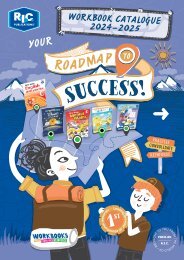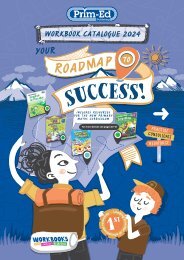PR-6785UK Astonishing Headlines Teacher Resource Book
You also want an ePaper? Increase the reach of your titles
YUMPU automatically turns print PDFs into web optimized ePapers that Google loves.
Name:<br />
RESEARCH TIPS<br />
Date:<br />
T rapped<br />
Research project<br />
Choose another well-known case of someone or something trapped from the list below, or find one<br />
of your own. Use these tips to help you write a newspaper article about it.<br />
• July 2004, 20 people are trapped 107 metres in the air aboard a hot-air balloon when its winch<br />
failed near Baltimore’s (USA) inner harbour.<br />
• July 2004, 4000 pilgrims are trapped by mudslides while travelling to the holy town of Badrinath,<br />
India.<br />
• November 1999, Seven explorers are trapped in a flooded cave in Southern France.<br />
• September 2001, Alan Mann is trapped along with 24 other people in No. 13 Elevator in the South<br />
tower of the World Trade Centre.<br />
• June 1985, Joe Simpson is trapped high on a mountain, and thought to be dead, in Peru.<br />
Use an encyclopedia, books or the Internet to research the event. Use two or more sources, such<br />
as three different websites, including a newspaper site.<br />
How to use an encyclopedia …<br />
• You can find encyclopedias in the reference sections of<br />
libraries as well as online.<br />
• Most encyclopedias include cross-references at the<br />
end of each article. This means that it lists other places<br />
in the encyclopedia where the event is mentioned.<br />
For example, facts about Kursk might be found under<br />
‘Kursk’, ‘submarine’ and ‘sinking’. Sometimes the crossreference<br />
will not be labelled, but it might be in small<br />
capital letters or italics.<br />
How to look for a book on the subject …<br />
• Using your library’s catalogue, do a title search or a<br />
subject search. Type the keyword ‘trapped’ and the place,<br />
date, person’s name involved in the event.<br />
How to find<br />
information on the<br />
Internet …<br />
• Photographs, maps,<br />
diagrams, charts and<br />
displays always make<br />
research projects more<br />
interesting. Use these visual<br />
aids to print and use with<br />
your report.<br />
Viewing Sample<br />
• If a book is shelved by author, it is a fictional or<br />
biographical book. Most nonfiction books are shelved by<br />
number using the Dewey decimal system. Use nonfiction<br />
or biographical books only.<br />
• Not everything on the<br />
Internet is correct! Be sure<br />
to find the information on<br />
a site that ends with .edu,<br />
.org or .gov. Or find the<br />
same information in three<br />
separate places. Maybe<br />
your school knows of some<br />
websites that may be of<br />
use. Ask your teacher or<br />
librarian for help.<br />
Prim-Ed Publishing ~ www.prim-ed.com <strong>Astonishing</strong> headlines 105

















